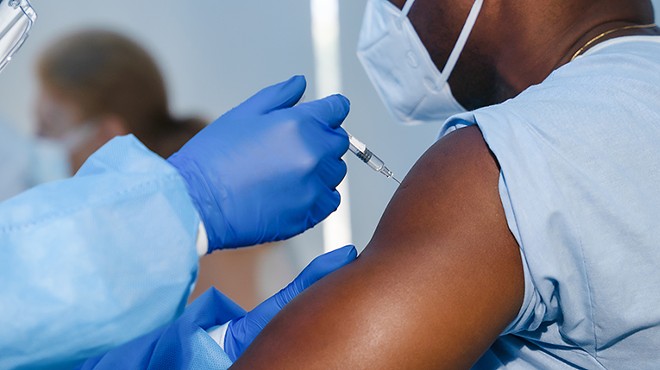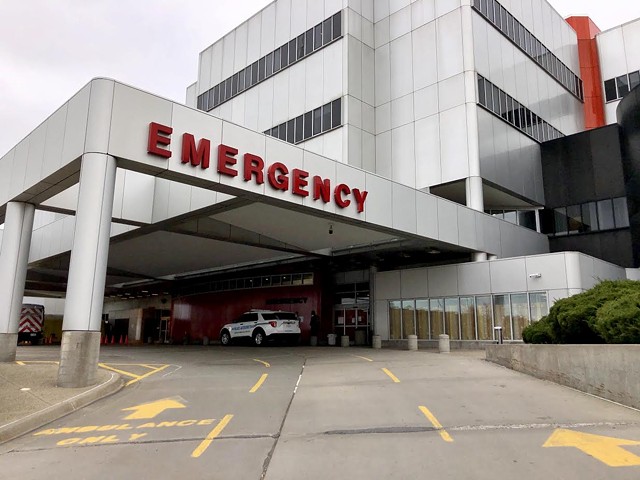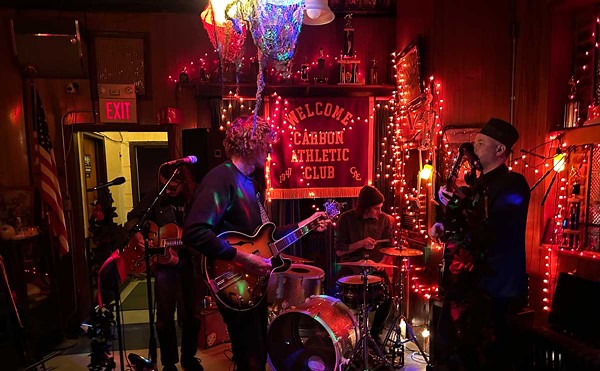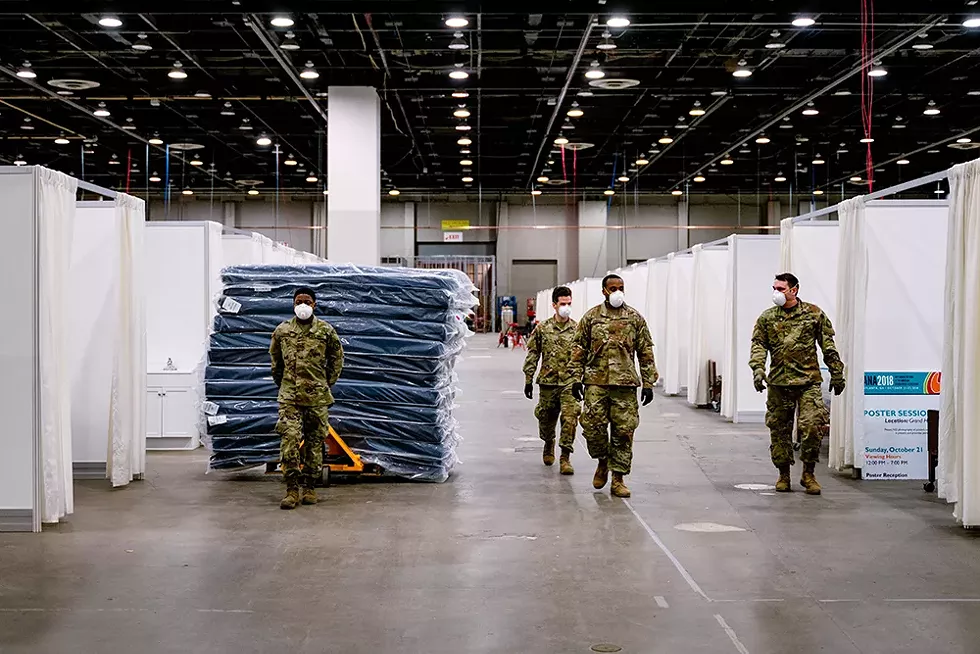
Bill Bennett couldn't afford to get sick.
Living paycheck to paycheck, he works part-time as a chef downtown with no sick days.
Then came the coughing, fever, and fatigue — the telltale signs of COVID-19, the disease caused by the coronavirus pandemic that originated in Wuhan, China, last year and has since reached nearly every corner of the globe. Without a doctor or health insurance, Bennett didn't bother getting tested.
"I just prayed and waited," the 46-year-old tells Metro Times.
That was nearly a month ago. He feels better now and is back to work, but his time off left him behind on rent and other bills.
And he considers himself one of the lucky ones. His uncle, also from Detroit, was rushed to the hospital last week because he couldn't breathe. He tested positive for COVID-19, and three days later, he died. He was in his late 60s.
"I have no words," Bennett says. "It came out of nowhere. No one was prepared for this."
The coronavirus is having an alarmingly disproportionate impact on African Americans, who make up about 13.6% of the state's residents but more than 40% of the more than 500 people who have died as of Monday, according to the Michigan Department of Health and Human Services (MDHHS). And the number could be significantly higher because there's no racial data on 28% of the fatalities. White people, meanwhile, make up 28% of the deaths but 75% of the state's population.
Black people account for 35% of the more than 16,000 positive COVID-19 cases in Michigan. Another 24% are white, and 35% are of an unknown race.
Few states have been hit as hard by the coronavirus as Michigan, which has the third-highest number of COVID-19 deaths and cases nationwide, behind New York and New Jersey.
"We are concerned about how COVID-19 is disproportionately affecting Michigan's Black community," Dr. Joneigh Khaldun, the chief medical officer for MDHHS, who formerly served as Detroit's health director, tells Metro Times. "We will continue to work to get more robust data and testing in the state so we can better understand the disease."
In Detroit, which is 80% Black, more than 175 people have died from the coronavirus, which is killing residents at a higher rate than New York City, the epicenter of the outbreak. As of Sunday, Detroit had a death rate of 24.7 per 100,000 residents, compared to 21.2 per 100,000 residents in New York City.
Few states have been hit as hard by the coronavirus as Michigan, which has the third-highest number of COVID-19 deaths and cases nationwide, behind New York and New Jersey.
tweet this
"We are really struggling in the Detroit area," Dr. Matthew D. Sims, director of infectious disease research at Beaumont Health Systems, tells Metro Times. "It's rough. It's a struggle."
Sims says population density and health care disparities are likely to blame.
"We have to find a way to prevent the progression of cases," Sims says. "It takes everybody working together."
Only New York City has more deaths in the country than Wayne County. Making up 18% of Michigan's population, Wayne County has 47.5% of the state's deaths and 47.8% of its confirmed infections, as of Sunday.
In suburban Washtenaw County, where 12% of the population is Black, 48% of the hospitalized coronavirus patients are Black.
In Oakland County, where the disease is spreading quickly, communities with largely Black populations are seeing the highest infections rates. They include Pontiac, Oak Park, Southfield, and Lathrup Village.
The pattern is repeated elsewhere in the nation. In Chicago, Black people make up 30% of the city's population and 72% of its COVID-19 deaths. In Louisiana, Black people make up 33% of the state's population and 70% of its COVID-19 deaths.
Health care inequity
The disproportionate impact on Black people is "nauseating," but not surprising, says Dr. Uché Blackstock, founder and CEO of Advancing Health Equity.
"It was obvious to me that marginalized communities would be the most impacted," Blackstock tells Metro Times. "The racial health disparities are incredibly profound and significant. And here you have this easily transmissible virus, and of course the most vulnerable people are going to be the most impacted."
Long before the coronavirus swept across America, underserved Black communities have been struggling with a severe health crisis. Generations of racist housing and economic practices have trapped many Black people in impoverished neighborhoods without adequate resources. In Detroit, where more than a third of its population is impoverished and many are uninsured or underinsured, residents are far more likely to have pre-existing health conditions like diabetes, asthma, high blood pressure, heart disease, and obesity. Asthma-related hospitalizations, for example, are three times higher in Detroit than the rest of the state, according to MDHHS, due to industrial pollution.
"The vulnerability to severe reactions is much higher because of structural inequalities," Dr. Gail C. Christopher, executive director of the National Collaborative for Health Equity, tells Metro Times. "People of color, and African Americans in particular, face a greater risk, and we need to take these things seriously. The first step is to begin acknowledging it."
Detroit and other communities with large Black populations are getting hit the hardest by the coronavirus. Detroit has a quarter of the state's coronavirus infections and deaths, but only 6.7% of the population.
Contagious diseases often spread faster in lower-income areas because many people rely on public transit, live in close quarters, and have jobs without paid sick days. A disproportionate number of lower-income residents also work in the service industry, where employees are in close contact with the public.
"Anybody who works in service industries is likely to have a greater exposure," Christopher says. "There is a greater prolonged risk because they are interacting with the public."
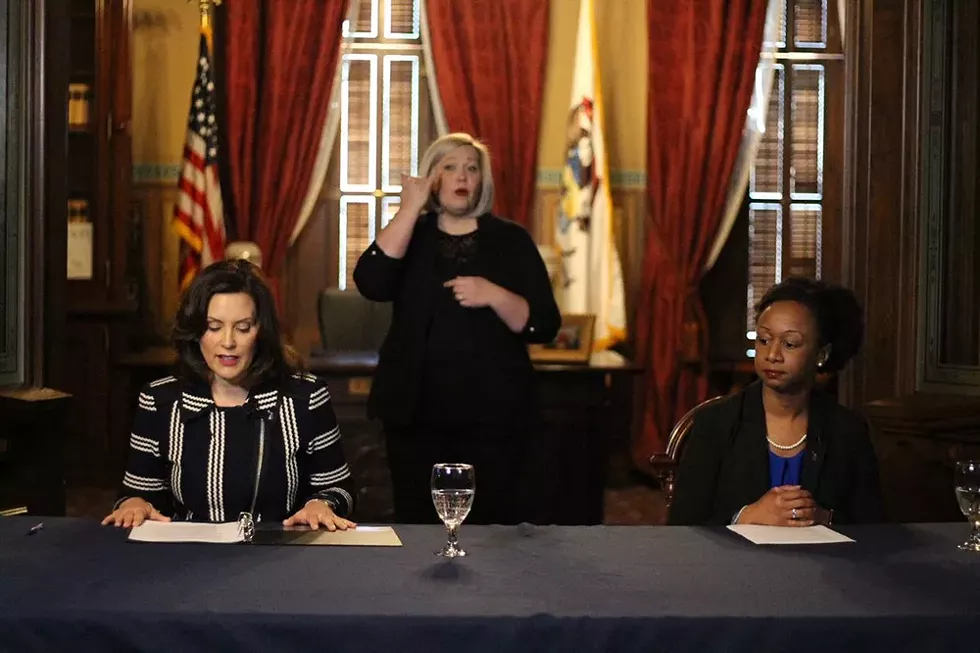
Tracking the impact
Michigan is one of the few states tracking or disclosing the racial breakdown of people infected with COVID-19. U.S. Rep. Rashida Tlaib, D-Detroit, is among the members of Congress calling on states to track racial data so that public health officials can address the health care inequities.
"We can't dismiss that there is a dramatic impact on our Black neighbors," Tlaib tells Metro Times. "If we try to downplay or ignore it, we won't be able to address it. We can't save people's lives if we don't follow the real data."
Tlaib and others also worry about residents whose water had been shut off. The city shut off water to thousands of households in the past two years due to delinquent bills. Despite calls from health officials and activists in February, the city waited until March 9 to restore water service. Hand-washing is critical to combat the virus.
Nearly two weeks after the city offered to restore the service, more than 2,500 houses were still without water. That same day, the city reported 75 confirmed infections, though the number was likely vastly higher because of a severe shortage of testing kits.
At the time, Detroit Water and Sewerage Department officials said they were trying their best to restore services, dedicating 10 crews to turning water back on. But, they said, the task turned out to be far more difficult than they had anticipated.
For some houses, it took hours to restore water because some homes have significant plumbing issues that need to be corrected before water can be turned on. Some water meters were also broken or missing.
Detroit has a quarter of the state’s coronavirus infection and deaths, but only 6.7% of the population.
tweet this
"We didn't have enough data to know that it would take this long," DWSD spokesman Bryan Peckinpaugh tells Metro Times.
On Friday, city officials said water service has been restored to a vast majority of the households. Of those that haven't been restored, workers were busy fixing significant plumbing issues, said DWSD Director Gary Brown.
"At the end of this program, we should have every single Detroiter with water," Brown said.
For essential city workers, the impact of the coronavirus has been devastating. A beloved bus driver and three members of the Detroit Police Department have died. All were Black.
More than 100 DPD employees, including Chief James Craig, have tested positive for COVID-19, and an additional 524 officers and 123 police civilians were under quarantine, as of last week. At least 35 firefighters and medics also have confirmed infections, and more than 100 have been under quarantine.
Greektown Casino has offered to use 75 of its hotel rooms to quarantine first responders and bus drivers. Atop the closed casino, the message #DETROITSTRONG, is lit up.
On March 17, a vast majority of bus drivers for the Detroit Department of Transportation refused to come to work until the city could better protect them. That day, city officials struck a deal with bus drivers to require riders to board and exit in the rear. The city is also waiving fares so customers aren't sharing the fare box, which is next to the drivers. Bus driver Jason Hargrove, who was part of the negotiations, posted a video on social media in which he complained that some riders were coughing without covering their mouths.
"This coronavirus shit is for real," he said in the video, which has since gone viral. He died days later after contracting the coronavirus.
Mayor Mike Duggan said "everybody in America" should watch Hargrove's video.
"He knew the crisis, he was vocal about the risks, and he went to work anyway," a visibly emotional Duggan said at a press conference on April 2. "He knew his life was put in jeopardy by somebody who didn't care, somebody who didn't take this seriously."
Buses are a vital service in Detroit because about a third of Detroiters don't have access to a car.
The coronavirus has claimed the lives of well-known Detroiters, including state Rep. Isaac Robinson, community leader Marlowe Stoudamire, two Wayne County Sheriff's deputies, retired restaurateur Otis Knapp Lee of Mr. Fofo's Deli, and educator Brenda Perryman.
The coronavirus also has infected state Rep. Tyrone Carter, City Council President Brenda Jones, longtime civil rights activist Rev. Horace Sheffield III, and Highland Park Police Chief Hilton Napoleon. All but Robinson are African Americans.
Alone and sick
The coronavirus has devastated Detroit's close-knit ballroom dancing community, which is predominantly Black. More than a dozen are reported dead.
One of the dancers is Anthony Best. His son, Anthony Williams, hasn't seen his 62-year-old father since he was admitted to Sinai-Grace Hospital on March 18.
"Fifteen of his friends (in the ballroom community) are gone, and he doesn't know it," Williams tells Metro Times. "It's tragic."
Best has been unconscious and on a ventilator for nearly three weeks. He's too ill for a tracheostomy.
Since visitors aren't allowed inside hospitals, Williams can't see his dad. A nurse sent Williams a photo of his dad last week.
"It's frustrating that we can't see him," Williams says. "At times like this, seeing his family could make the difference."
While Harvey Puckett was fighting for his life on a ventilator, his wife and son were under quarantine. Outside the hospital, other members of his family held a sign that read, "Hurry home Harvey. We love you!!!"
His family was hopeful. He was 54 years old, healthy, and worked every day.
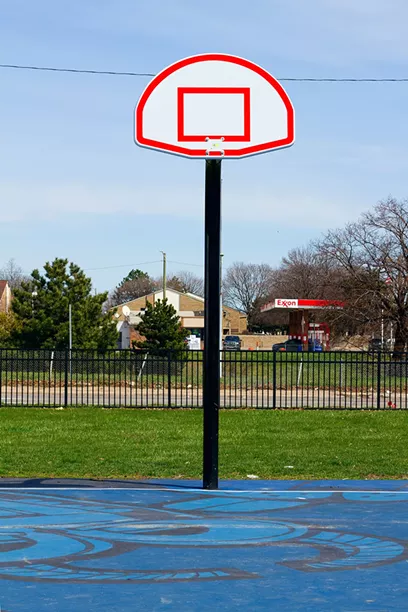
A few days later, he died.
"I have never seen anything like this," his cousin, Rene'ee Wilks-Bryant, tells Metro Times. "You are hopeless. You can't do anything."
Wilks-Bryant says she worries about this "horrific virus" and its impact on other families.
"You live in fear for others," she says. "This new way of life is already scary. It's a horrible way to lose someone you love."
Public health officials are worried the worst of the coronavirus is yet to come.
"We know the apex probably is not until the end of April or the beginning of May," Gov. Gretchen Whitmer said on April 2. "This means we are a month out before we hit the height of this."
Last week, top federal government officials estimated that between 1,000 and 4,500 Michigan residents will die, but only if everyone adheres to the social-distancing measures. On March 23, Whitmer issued an executive order calling on all residents to stay home except to conduct "essential" business. On Monday, she indicated she would likely extend the order through the month.
In Detroit, city officials have been alarmed by videos posted on social media that show large groups of people congregating in defiance of Whitmer's stay-at-home order.
Duggan warned that New York City "is our future if we don't change our behavior."
Duggan said a vast majority of Detroiters are adhering to the social-distancing measures, but he and public health officials are worried that the few who are ignoring them are placing the rest of the city at risk.
"I expect the police department to be very strong in dealing with groups that are gathered and have no reason to be in public," Duggan said at a press conference Friday.
The city has begun removing basketball rims at parks to discourage clusters of people. Duggan said the city is considering closing parks and even imposing a curfew if people don't stay home.
"If we have to go to a curfew, we will," Duggan said before adding, "We're going to step up the tickets and take stricter and stricter actions until we get more enforcement."
Last week, officials changed the penalty of violating the stay-at-home order from a $500 fine to $1,000.
Many hospitals are already at capacity and are running out of ventilators, intensive-care beds, and personal protective equipment like masks, gloves, and gowns. At Beaumont Health System, dozens of health care workers have been infected with COVID-19. With a critical shortage of heath care workers, Whitmer is calling on out-of-state nurses, doctors, and respiratory therapists to come to Michigan.
Meanwhile, the U.S. Army Corps of Engineers is converting the TCF Center (formerly Cobo Center) in downtown Detroit into a 1,000-bed field hospital, which is expected to begin serving COVID-19 patients on Thursday. Sixty beds will be dedicated to seriously ill patients; the other 40 are for recovering patients.
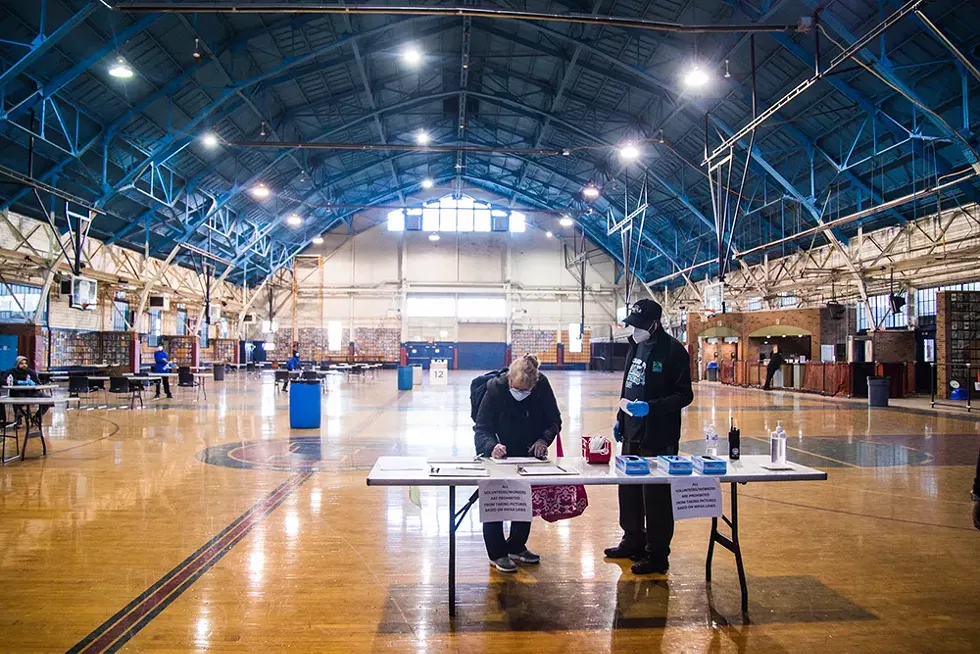
Lack of testing
Since Michigan confirmed its first case of the coronavirus on Tuesday, Feb. 10, the same day more than 1 million people voted in the state's primary election, the number of confirmed infections has increased exponentially. The state was unable to adequately track the rapid spread because the federal government botched the rollout of testing kits.
"As a country, we did not make tests available quickly enough to be able to fully understand the scope of the problem," Khaldun said on March 23, when the state's death toll reached 15.
Without the ability to identify who was sick, public health officials had no idea where the virus was spreading. It took nine days before the state was able to identify 100 cases. By then, the coronavirus had taken root and was quickly spreading throughout Detroit and other nearby communities.
Jamon Jordan, who teaches local African American history, was nursing a 103-degree temperature with a sore throat and body aches when he tried to get tested in mid-March. Jordan, who has asthma, was turned down by two hospitals and spent several days going through doctors to get tested. Eventually, after spending hours on the phone, he was tested. His 66-year-old mother, who had underlying medical conditions, was turned down for testing. Less than a week later, she was seriously ill and was rushed to the hospital by ambulance.
"She was gone an hour later," Jordan explained in a heartbreaking Facebook post. "Testing can lead to you getting into the hospital, getting on a ventilator, having fluids and other medicine provided through IV, and dealing with other health issues you may have that are exacerbated by the virus," he wrote. "That's why the problem of getting tested has caused many people to die."
Public health experts say widespread testing is critical to combating the coronavirus.
"We have no idea what the rate is of sick people in the population because we don't have widespread testing," says Dr. Betty Chu, who is leading Henry Ford's coronavirus response. "There are sick people out there, and we need to know who they are."
Frustrated by the lack of testing, Duggan led the creation of a regional site at the former Michigan State Fairgrounds at Eight Mile and Woodward, where he expects at least 14,000 people will be tested for COVID-19 over the next six weeks. During the first two days, 43% of the people who were tested were positive for the coronavirus. The city is also working with doctors who are willing to see patients who don't have insurance.
"We're going to make testing available to every single person in this city who needs [it]," Duggan said during a press conference Thursday. "It is critical that every single Detroiter have access to this."
Last week, the city became the first municipality in the United States. to begin using testing kits that provide results within 15 minutes. The 5,000 kits from Illinois-based Abbott Laboratories are reserved for police officers, medics, and firefighters.
"This is a game-changer," Duggan said. "We will be fighting the coronavirus for months. We need the tools to fight back."
Fighting back
On Friday, Duggan called on residents to cover their face if they go outside.
"It is time for people in our community to put on a mask or a scarf before you go out to the public," Duggan said. "I don't want to see anyone get on a DDOT bus without something over their mouth."
With the lack of testing, it's too early to gauge the impact of the state's stay-at-home orders.
"The governor's order only went into effect less than two weeks ago, and it is very likely that folks who are tested today may have well been infected prior to the order," Denise Fair, Detroit's chief public health officer, tells Metro Times. "We do not yet fully know the impact of the stay-at-home order on transmission in the community."
Racial-justice and anti-poverty advocates say the coronavirus' devastating impact on Black communities underscores the importance of stamping out inequality.
"While Detroit has made headlines for the economic turnaround in its business corridors, the real story has been how the majority, African American residents of the city have been left out of the economic benefits and investment," Tina M. Patterson, president and director of research at the PuLSe Institute, an anti-poverty think tank inspired by the journalism of local columnist Bankole Thompson, tells Metro Times. "Until Detroit officials make tackling poverty and inequality a top priority, African Americans will continue to suffer disparate treatment, even after the pandemic has run its course in the region."
Stay on top of Detroit news and views. Sign up for our weekly issue newsletter delivered each Wednesday.

